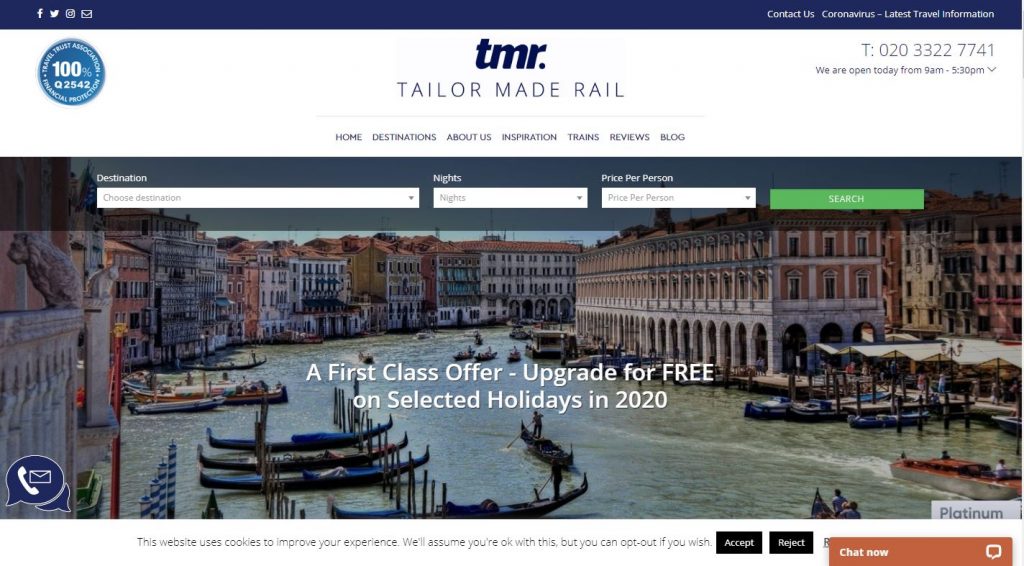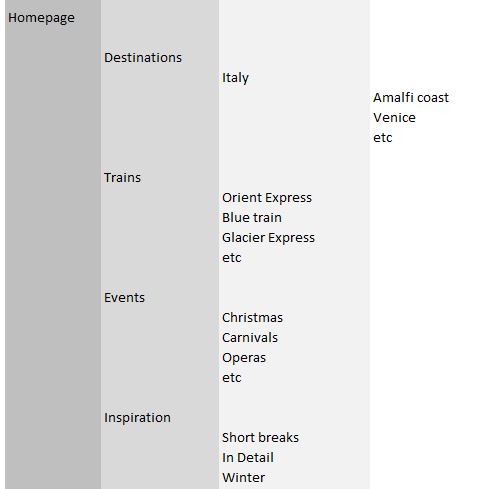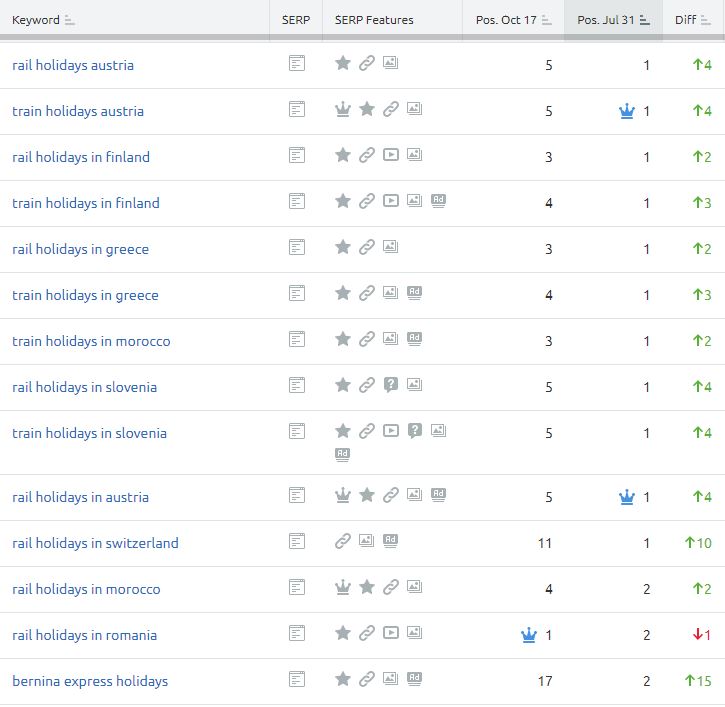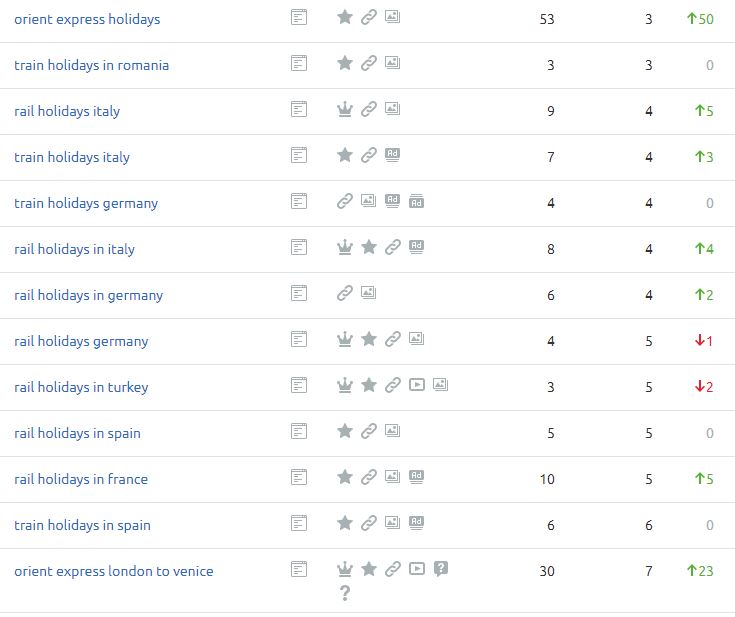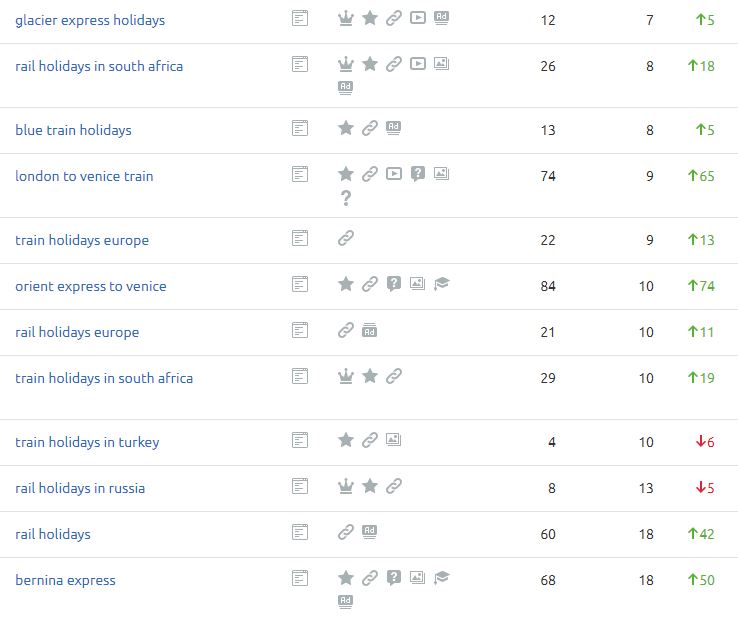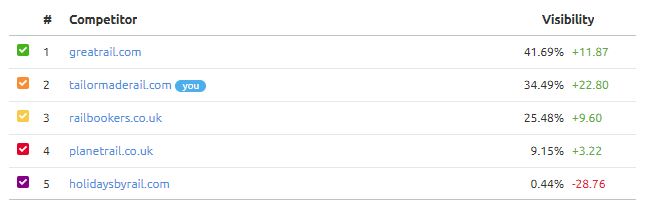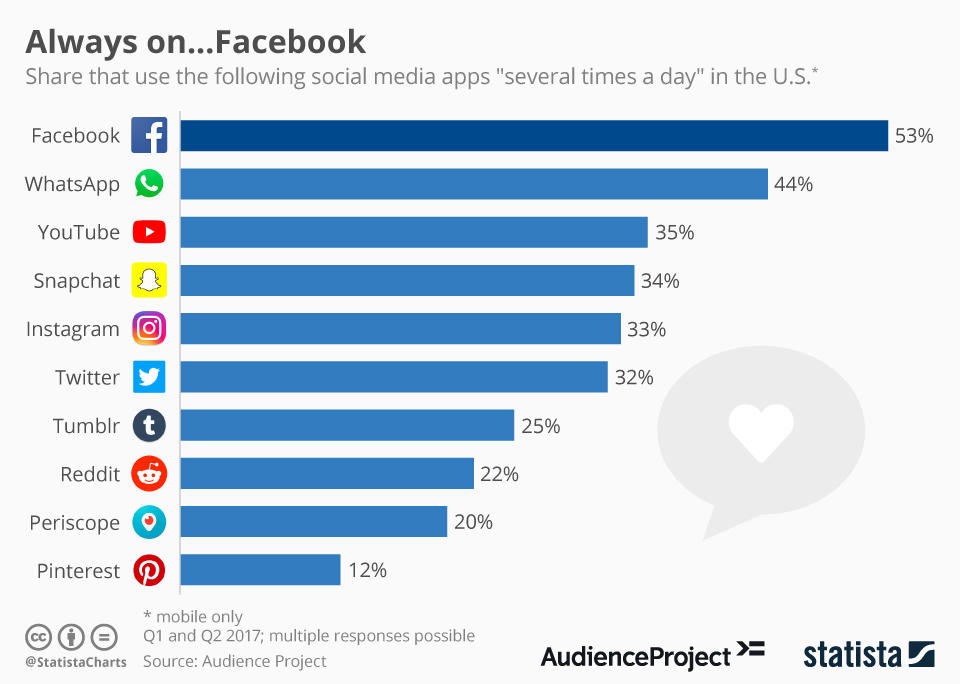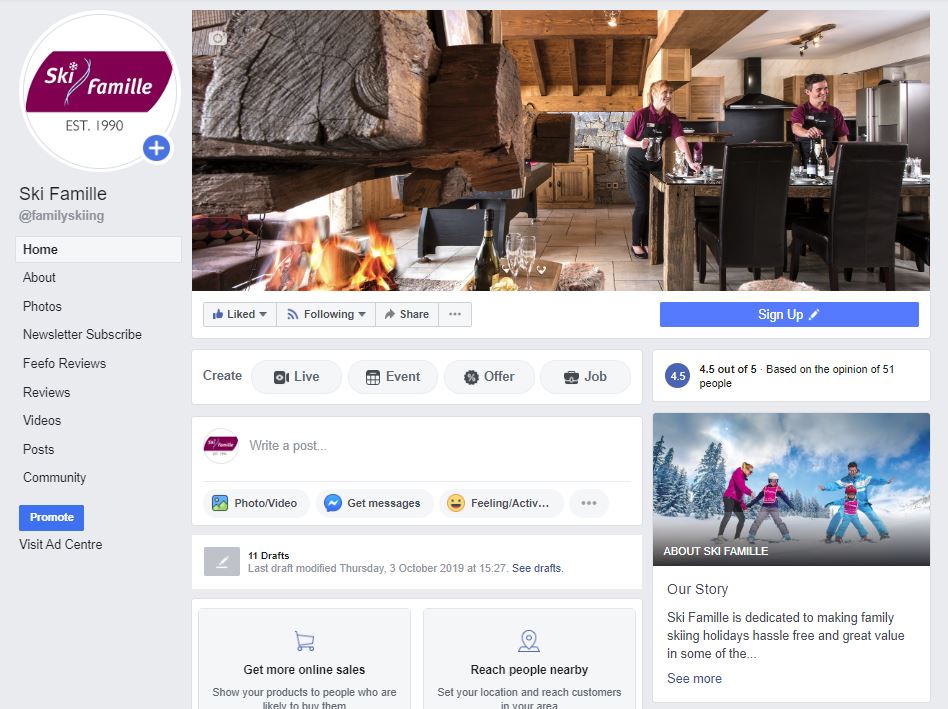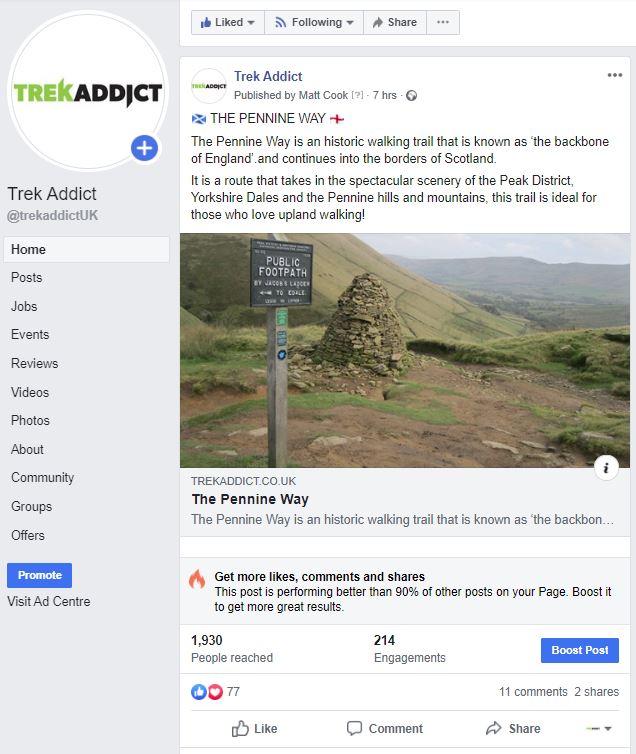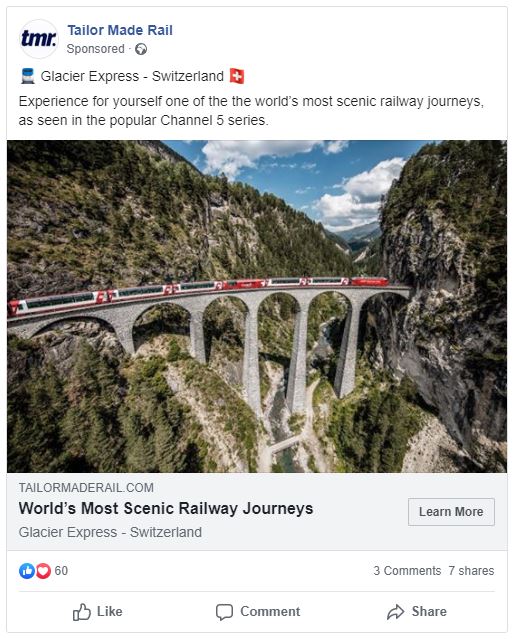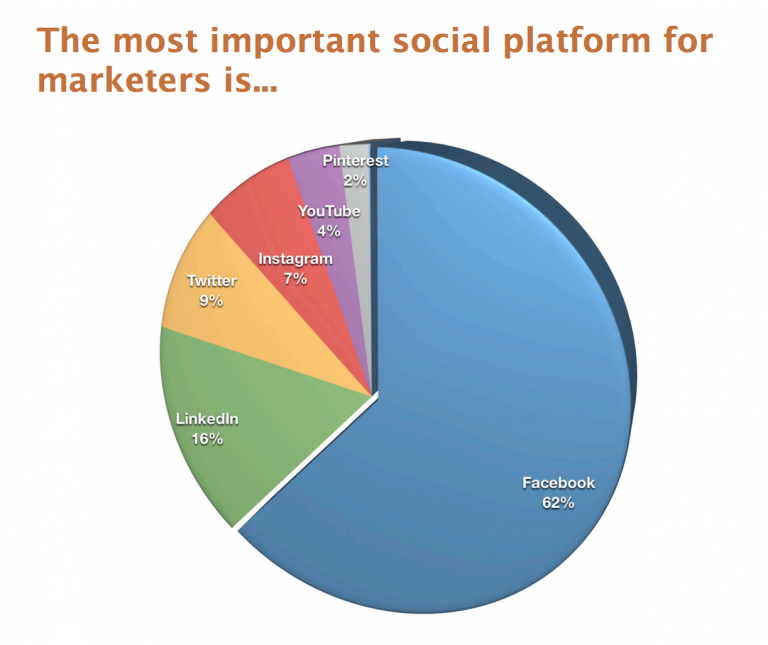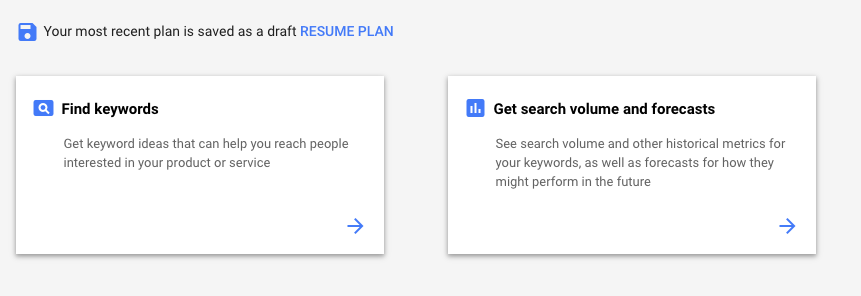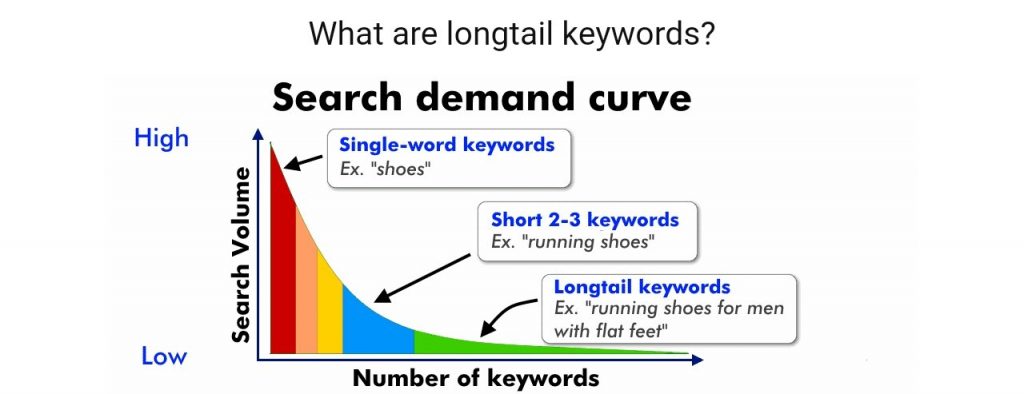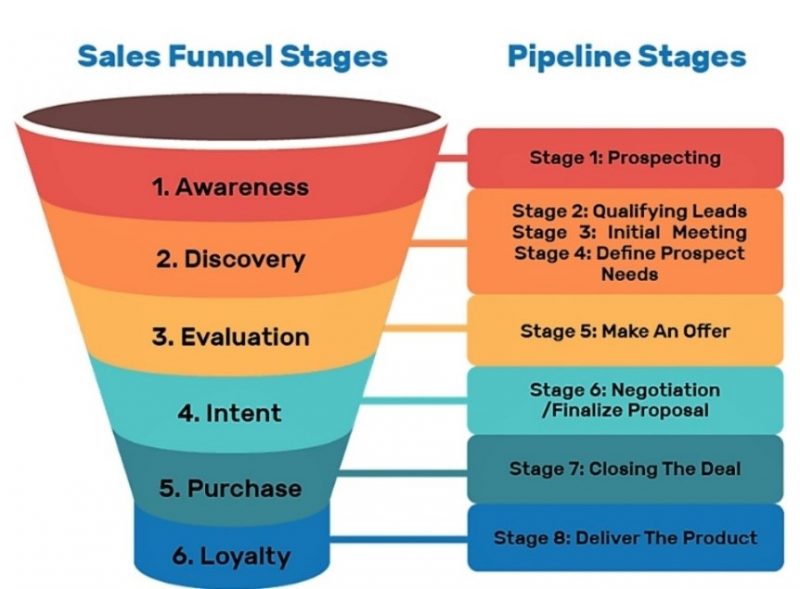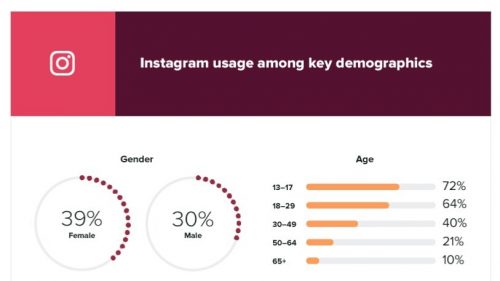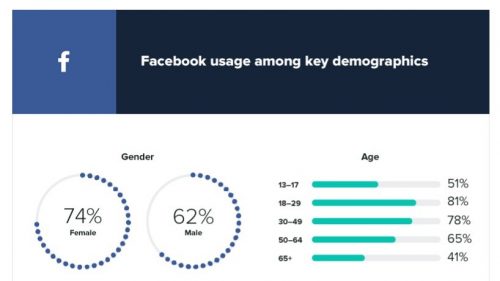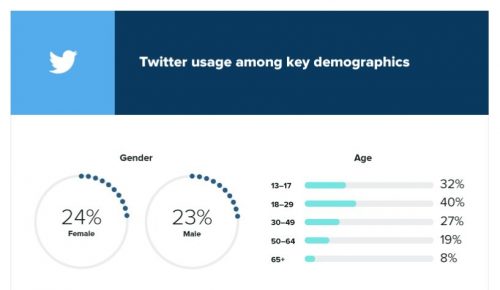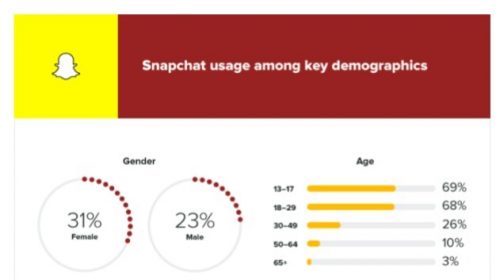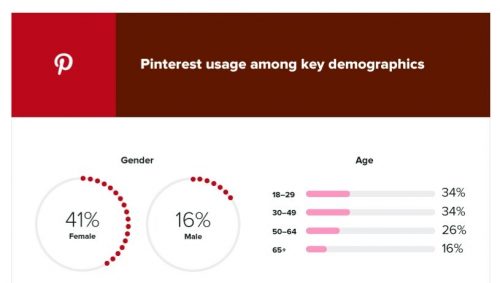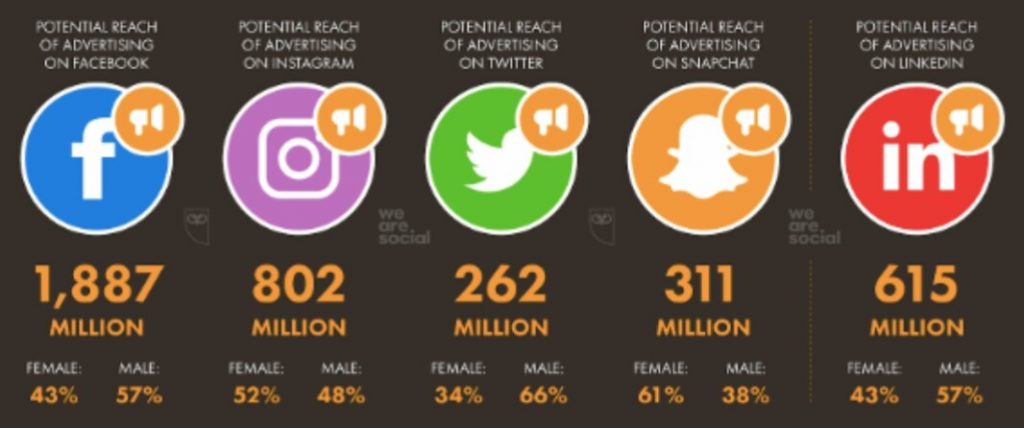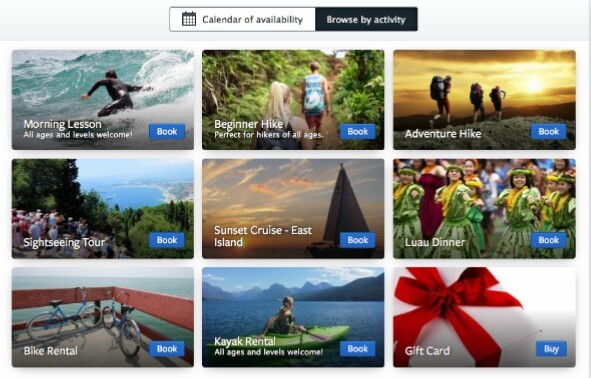In this case study we’re going to show you how to follow a repeatable process to greatly improve SEO rankings for a NEW website.

If you’re expecting this article to tell you how to cheat at Search Engine Optimisation without putting in much effort, you’re in the wrong place!
With a new website, there needs to be a focus on improving organic performance gradually.
This article shows you the process we put in practise with new clients to effectively improve search engine rankings, whilst protecting the long-term health of your website.
Today’s SEO case study features Tailor Made Rail, a fast-growing travel business offering specialist rail holidays throughout Europe and further afield.
Whether you’re looking at a new site, or an update to an existing site, this article will look at developing the authority of a domain with limited existing history or authority.
Step-By-Step SEO Process
The Challenge
Our initial focus when engaging with the Tailor Made Rail team was on understanding more about the business, the most important search keywords, and the existing SEO limitations.
The existing website was using a Wix Content Management System (CMS).
The Wix CMS platform had limitations which restricted SEO performance, with the site also looking dated and was not performing effectively in converting visitors into enquiries.
The pre-existing website was ranking poorly for all relevant search terms, resulting in the business looking to invest in improving their search performance.
Organic traffic was not delivering value for the business, and hence a focus on improving the overall SEO performance of the site was required.
Step 1
Re-building The Website
There are a range of reasons why businesses invest in a new website.
A website is essentially your shop window, representing your business and providing the opportunity to effectively market and sell your products.
A new website is important if:
- You do not currently have a website.
- Your current website is not performing well in terms of site speed (an important SEO ranking factor).
- Your current website is not performing well in terms of converting visitors into enquiries or sales (conversion rate).
- Your current website has SEO restrictions (such as limitations regarding the URL structure), or does not allow you to effectively manage your site content.
Working closely with the team at Tailor Made Rail, we embarked on a project to modernise the businesses web-presence.
The focus for the project was on ensuring the new website effectively highlighted the quality of the products on offer whilst providing a clean user-experience.
The site was designed with SEO in mind from the outset, focusing on a logical site-hierarchy and effective use of on-page optimisation.
The new website included:
- Mobile responsive design – An important SEO ranking factor
- An easy-to-use, SEO-friendly WordPress platform
- Well optimised landing pages focused on specific search terms
Whilst re-developing a website, or creating a new website won’t automatically result in tangible SEO benefits, a poorly optimised or slow-loading website can be the primary reason why you’re not seeing the results you would have hoped for.
You can see how your site is performing regarding page speed using Google Speed Test or GT Metrix.
Step 1 – Summary
- A modern website is crucial for SEO performance
- The loading time for your website is a key consideration
- Your website should be user-friendly with clear calls-to-action
Pro Tip
Correctly implementing 301 re-directs is a crucial part of re-launching a new website.
Effective re-directs ensure that any rankings previously earned are maintained, and ensure that search engines can correctly re-route users to the most appropriate content.
Step 2
Keyword Research
Effective keyword research is a crucial part of building a new website.
The aim is to utilise research tools to identify keywords which offer high monthly search volume., as well as conversion intent.
Conversion intent relates to keywords clearly showing the intent of the user to purchase.
For example, ‘Orient Express Holidays’ would be used by searchers looking to holiday on the Orient Express (clear conversion intent); whereas a search simply for ‘Orient Express’ (which has higher search volume) would likely include a wide range of information searches.
The most effective free keyword research tool is Google Keyword Planner which, provided you are currently running paid PPC ads, gives you accurate search volumes for related terms.
The keyword research process is also useful to identify any ‘low-hanging fruit’ which are pages ranking just off the first page of Google.
These keywords provide opportunity to deliver immediate ROI, with a focus on improving ranking positions of these pages into top 10 positions.
Once a range of related keywords have been identified, a crucial step is to ensure that there are unique landing pages created to target each key-phrase.
Where possible, the proposed URL structure for your new website should highlight to Google which pages are more (or less) important, based on their position in the site hierarchy.
A simple Excel (or shared Google Sheets) document is a sensible way to understand for yourself the ideal hierarchy for your website, whilst also ensuring all key search-phrases are targeted with dedicated landing pages:
A core element of deciding the URL structure process for the new website is to identify whether keywords with sufficient volume would be better served through a static landing page, or a blog post.
- Landing page
A sales-focused landing page, such as a destination (i.e. Italy) or experience (i.e. luxury rail holidays) is designed to highlight relevant product and provide clear calls-to-action (CTAs).
A landing page ideally will have a logical position in the site hierarchy, and is not a date-specific piece of content.
Effective landing pages will have a strong impact on the total number of conversions from organic traffic:
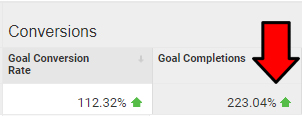
An example of a landing page would be https://www.tailormaderail.com/destinations/italy
- Blog post
Blog posts provide the opportunity to add a large amount of content to a page which greatly improves overall SEO performance.
A blog provides the opportunity to link to relevant sales-focused pages, improving the internal link profile of key landing pages.
Blogs may include answers to relevant questions (i.e. What to pack for an Orient Express holiday?) or lists (i.e. Best rail holidays in Europe).
Step 2 – Summary
- Keyword research is key to effective SEO
- Identify keywords offering strong search volume
- Look for keywords with conversion intent (i.e. holidays)
- Ensure you have a unique landing page targeting each key-phrase
Pro Tip
Create a document containing your new URL structure, as well as the URLs of any existing any existing articles which they are replacing.
This will allow you to better manage the migration and ensure that no content is missed in the site migration.
Step 3
Improving Existing Content
Where possible, the amount of content on landing pages or blog posts needs to be increased.
Pages with thin content are those which have a low text to html ratio.
Generally speaking you don’t want pages with less than 500 words of original content being crawled by search engines. Ideally, content will have a minimum of 1,000 words.
Reviewing and improving existing content provides 3 main advantages:
- Increased content depth increases the possibility that each article ranks well in search engines.
- Improving the content to include clear calls-to-action (CTAs) ensures that ALL of your content is working hard to convert visitors into enquirers (and hopefully bookers)
- Adding relevant internal links (to appropriate sales-focused landing pages) improves the websites internal link profile, improving SEO performance.
Existing content, in whatever form, is your best starting point to improve your overall SEO performance.
Similarly to the keyword research process detailed above, an effective process for review outstanding content is simply using an Excel doc.
With a new (or fairly new) website the amount of pre-existing content will be very limited, allowing you to quickly group content into 3 key categories:
- Fine as-is
- Needing review
- To delete
Whilst the aim is to develop your authority with new content, the best place to start is to ensure ALL content on your site is representing your business in the best possible way.
Key steps for improving content involve:
- Adding additional content
- Adding/improving imagery
- Adding/improving calls-to-action
- Adding additional internal links to key sales pages
- Change keyword focus, if required (based on keyword research)
Step 3 – Summary
- Review existing content – Identify those pieces in need of improvement
- Ensure all landing pages and blogs are effectively optimised for specific key-phrases
- Improve content depth (where possible)
- Lay out text for mobile (short and succinct content sections)
- Add imagery to sell your product and break up text sections
- Add clear calls-to-action to all pages
Pro Tip
Focus on adding as many relevant internal links as possible, but don’t over-do it.
The link format for an internal link should simply be:
/destinations/italy
as opposed to:
https://www.tailormaderail.com/destinations/italy/
Step 4
Link Building – Start Sloooow with a NEW Website
With any new website, there are limitations.
Depending on how new the site is, and whether the new site is replacing an existing website; Google will likely have little prior perception of the authority (or importance) of your website.
Whilst the aim is to improve Google’s overall picture of the authority of your new site as quickly as-is possible, effective SEO involves ensuring that any growth in authority appears natural:

Links to the homepage are important to the performance of a new domain, developing the overall Domain Authority which has a strong bearing on the SEO performance of all pages.
This focus on links to your homepage using branded anchor text (your brand name or URL) is the safest way to improve your overall SEO performance, whilst also protecting the long-term health of your website.
The process ensures that all pages benefit from the increase in top-level domain authority.
Step 4 – Summary
- Focus on links to your homepage
- Start by using natural anchor text (brand name and URL)
- Develop links from high-authority domains
- Start with a limited number of links per-month (ensure the link building rate looks natural)
Pro Tip
A natural link profile will have most links pointing to the homepage, therefore your initial link-building is best-utilised focused solely on the homepage.
Step 5
Start to focus on deeper pages
All pages need external links to rank well in search engines.
The number of links needed to be competitive depends upon the page, the site, your niche, the type of query and so on.
Lower-level pages may only need a limited number of direct links to rank well, so it’s important to understand your site structure and the relationship between pages:
Remember, a link to a ‘Category Page 2’ (in the example above) will benefit any pages set as children of that page.
Therefore it’s worth deciding (based on your keyword research), which pages you will focus on with links, and how links to this page will also benefit others.
Hence the Homepage has the highest overall link benefit to your site.
The focus needs to be on increasing the number of high-quality links, at a rate which looks ‘natural’ to Google.
When developing links, the key is to identify websites which have relevance to your brand.
In the example of Tailor Made Rail, we were looking for websites and blogs which were related to trains, travel and holidays in Europe.
Content placement on 3rd party websites needs to follow a few key guidelines:
- Work with the highest authority domains you can afford with your budget – high quality link development cost money, there’s no getting away from this!
- Create in-depth content – aim for at LEAST 1,000 words of well-written content (more if possible although don’t add filler just to meet the word-count)
- Add your link towards the start of the piece – early links carry the most value
- Ensure that your link looks as natural as possible – ideally the link should look like a natural citation (reference)
- Add a selection of good quality links to the piece – ensuring that the additional inks are pointing to high-quality websites and that there are a selection of links to eCommerce and informational resources.
Step 5 – Summary
- Target specific landing pages ranking just off the first page of Google
- Consider the relationship between pages
- Start to use optimised anchor text (the keyword the page is targeting
Pro Tip
Use optimised anchor text carefully. The more natural, the better.
You need to ensure that your overall anchor text ratio is not too highly focused on optimised keywords.
Step 6
New content strategy
Whilst the process of updating existing content and creating new links from high-quality external websites will take time, there needs to be a focus on creating new content.
A new content project will follow on from the keyword research, identifying which keywords are not being effectively targeted through pre-existing landing pages.
Once identified, the blogs or static landing pages need to be effectively optimised for search engines, which primarily includes ensuring page titles and headers are optimised for the selected target keywords.
To ensure that Google regularly visits your site, and hence indexes any new content quickly, it is important to publish content.
Step 6 – Summary
- Content is king
- The higher your keyword count, the better chance of your pages ranking well in Google
- Internal links between related pages are important SEO ranking factors
Pro Tip
Adding social credibility to your blog posts (including Facebook likes) will improve your SEO performance.
This is an increasingly important SEO ranking-factor.
Results
As a result of the processes above, the overall SEO performance has been very strong.
There has been a clear increase in total visitors from organic traffic:
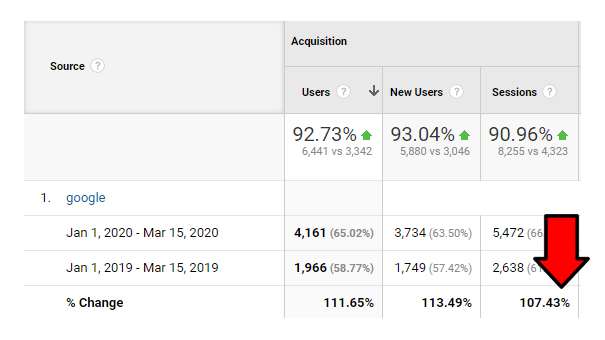
The SEO project has delivered noticeable improvement in the organic ranking for key search terms:
Organic Rankings
(Source: SEM Rush October 18 – July 20)
Aside from the key-phrases targeted above, the focus on links to the homepage delivers an increase to the overall Domain Authority.
This subsequently results in a wide range of keywords increasing ranking positions.
Ranks in Top 10 Positions
The number of keywords ranking in Top 10 positions in Google has improved dramatically during this time: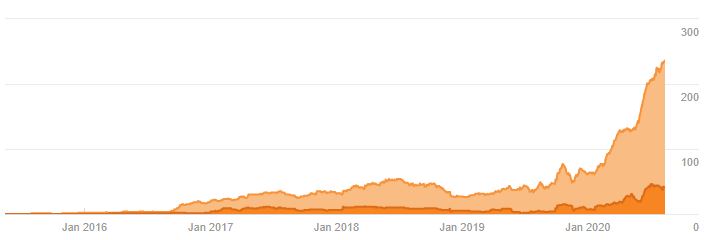
(Source: AHrefs)
Value of Organic Traffic
The overall value of organic traffic has increased significantly:
(Source: AHrefs)
Overall Organic Traffic
With a strong increase in overall organic traffic.
Performance Vs Competitors
When comparing overall performance with key competitors , the growth has been very encouraging:
As a result of the growth, the business is now out-performing long-established competitors.
Feedback
“Having worked with Apollo for 2 years now, we have been delighted with the accessibility and delivery of PPC and SEO services, as well as assisting us in building two new SEO-friendly websites for our UK and Australian operations.
I would have no hesitation in recommending Matt and his team to anyone looking to enhance their online presence and drive their business forward.”
Simon Hodge, Managing Director, Tailor Made Rail
Talk To Us
Whilst your SEO performance is something which requires a hands-on approach, the best best is to talk to the experts.
Get in touch with us today for a FREE, no-obligation SEO Audit to understand your current performance and the potential opportunities.

